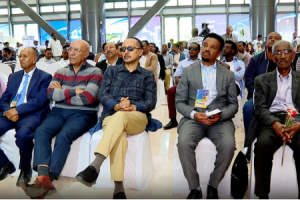
Many female authors of Ethiopian origins across the globe can put their mark in the literature world, become renowned, win awards and make a name for themselves as best fiction and non-fiction writers.
Among these successful female writers, Ethiopian-American novelists Maaza Mengiste, author of the novel titled. “The Shadow King” is the one.
Maaza, also a photographer, in her novel which narrates about a young Ethiopian woman who courageously helped to defend her homeland during the Italian invasion of Ethiopia in 1935, won various awards such as a 2021 Edgar Award for Best Short Story and a 2020 Award in Literature from the American Academy of Arts and Letters.
Aida Edemariam is the other Ethiopian Canadian Journalist and Writer who can achieve success and earn admiration for her outstanding non-fiction pieces. The book she wrote based on her grandmother’s stories under the title “The Wife’s Tale” won a Royal Society of Literature Jerwood Award for a work of non-fiction in progress and the 2019 Royal Society of Literature Ondaatje Prize for a vivid biography of her Ethiopian grandmother.
“The Wife’s Tale” biography, which captures the hearts and minds of the readers from the beginning to the end, depicts the story of her grandmother, which occurred more than 100 years ago through female protagonists.
Meron Hadero is the other Ethiopian-American writer who became the first female Ethiopian author to win the biggest award in African literature, ‘AKO Caine Prize’ since the Prize’s inception in 2000.
Novelist and short story writer, Meron, who is also sister of the singer Meklit Hadero, was born in Addis Ababa, Ethiopia. It was during her childhood, she arrived in the United States as a refugee through Germany. She studied history and American studies at Princeton University, attended Yale Law School, and completed a master’s program in creative writing at the University of Michigan.
As she mentioned repeatedly, she loves to read ever since she was a little kid, and her love of writing came from that. “I adore that writing is both analytical and imaginative, which I find fulfilling. I also love that writing asks for and creates empathy, and it embraces great compassion because if we are to make our characters feel human and real, they require our care. Because of that, writers have the great privilege of putting ourselves in the shoes of others, understanding and appreciating other lives, and if we are able to fully embody other characters, living many lives as well.”
In her short stay with BBC Focus on Africa following the award, and regarding her creative works, Meron said that stories of “refugees, immigrants and those at risk of being displaced” are always the “entry-point emotionally” to her work.
“With The Street Sweep, he has that threat looming. He is facing losing his ancestral home, and that’s the real driver of the story that makes him take charge and try to re-write that outcome that seems kind of inevitable,”
Much of The Street Sweep is set in Addis Ababa’s Sheraton hotel, where Getu is invited for a party. “Looking through his eyes, it is almost a culture shock when he goes there. I did want to paint that contrast… What does that access mean? And what does that bestow? That’s the bigger question of what those open doors represent.”
“I am absolutely thrilled, I’m in shock – being shortlisted in itself was a huge honor,” she remarked while talking about winning this prestigious award.
While responding to a question for being the first Caine Prize winner from Ethiopia, a country full of literary talent, and how it feels to achieve this milestone, Meron said: “It is a huge honor for me, and hopefully it may inspire others from Ethiopia to write their own stories. I mentioned my mother before who decided to become a doctor after seeing a female doctor for the first time as a child. I think representation is important, and the more diversity the better—the more impact it can have, the more connection it can make.”
Announcing the winner, the AKO Caine Prize jury stated that “The Street Sweep” is superbly crafted, the language fluid, and weighted with color and memorable symbolism.
“A Down Home Meal for These Difficult Times” [2022], is also the other short story collection of Meron Hadero, that centers on migrants, refugees, and those affected by displacement. It is about the highs, lows, and ordinary days of Ethiopian life. In her debut story collection, Addis Ababa–born Meron addresses Ethiopian Americans’ struggles for acceptance, the painful ties between present and past, and the elusive meaning of home.
Appearing in Best American Short Stories, “The Suitcase” follows a woman visiting her country of origin for the first time and finds that an ordinary object opens up an unexpected, complex bridge between worlds. Shortlisted for the 2019 Caine Prize, “The Wall” portrays the intergenerational friendship between two refugees living in Iowa who have connections to Germany before the fall of the Berlin Wall.
While talking about her creative works, Meron said that all the stories in this collection focus on home; the idea of it, the characters are seeking it, dreaming of it, fighting for it, creating it, and abandoning it.
Meron reflected on the themes she is attracted to as an Ethiopian-American writer and explores what it is like to create the space between Ethiopia and the United States with the turn of the page.
“I find that writing keeps its own time. The writing process is long—there’s the thinking/planning, the first draft, and also all the many revisions that follow. I thought a lot about the story before writing, then sat down to work on the first draft, which came together quite smoothly, but revisions after that were the longest part of the process.”
The Caine Prize described “The Street Sweep” as a tale for the “young, ingenuous generation determined to push open the doors previously closed to them.” What are these doors; are they still closed today? And has your life, or anyone’s you know, intersected with this larger struggle?
Meron’s short stories have appeared in various journals and anthologies. In 2021, she became the first Ethiopian writer to receive the ‘AKO Caine Prize’ for African Writing for the short story “The Street Sweep,” which is about the experience of an 18-year-old boy, an Ethiopian street sweeper who must contend with the power dynamics of foreign aid organizations.
BY STAFF REPORTER
THE ETHIOPIAN HERALD THURSDAY 9 MAY 2024





